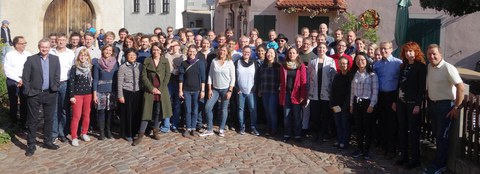Feb 04, 2022
Uncovering the mechanisms of volition: CRC 940 "Volition and Cognitive Control: Mechanisms, Modulators, Dysfunctions"
The team of more than 60 psychologists and neuroscientists from the TU Dresden, together with cooperation partners from the Charité Berlin, will continue their effort to elucidate the mechanisms underlying human volition and self-control for another four years.
In the past eight years, CRC researchers have already made substantial progress with respect to their overall goal to elucidate the cognitive and neural mechanisms, which underlie the ability to exert volitional control over one's actions and emotions and to understand determinants of impaired self-control. By combining psychological experiments with advanced functional neuroimaging methods, CRC researchers were able to identify regions of the prefrontal cortex, which mediate the maintenance of intentions and the ability to shield intentions against distracting stimuli or undesired impulsive responses. Moreover, major advances were made in uncovering the neuronal circuits underlying the control of voluntary goal-directed actions as opposed to automated habits. The newly gained insights about the mechanisms of human decision-making and action control have substantially contributed to a better understanding of why individuals often exhibit impaired self-control and make shortsighted decisions in their daily life, which are associated with adverse personal consequences and great societal costs. The spokesperson of the SFB, Prof. Thomas Goschke, attributes the success of the CRC to the fact that it "combines in innovative ways interdisciplinary basic research on neurocognitive mechanisms of volition and self-control with applied themes of high clinical and societal relevance”.
In the third funding period, the researchers will investigate whether dysfunctions of neurocognitive processes underlying impaired self-control predict the long-term risk of addiction and other mental disorders, why self-control is specifically impaired under severe stress, and how such impairments affect social interactions. According to Goschke, the long-term vision is to lay foundations for improved prevention and therapy of disorders of self-control based on insights into the neurocognitive mechanisms of voluntary action control and thereby to provide new impulses for the social and philosophical discourse on freedom of will. https://tu-dresden.de/sfb940
Spokesperson: Prof. Thomas Goschke, TU Dresden
Partners: TU Dresden, Charité Berlin
Funding: ca 10 million EUR
CRC 940: Volition and Cognitive Control

